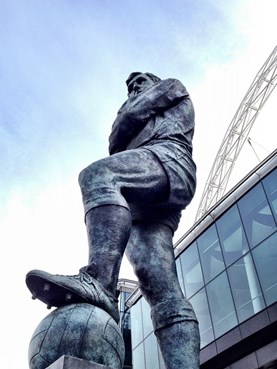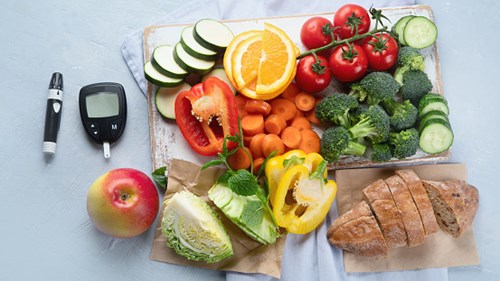The Ghost of the Hypo
The hypo is the demon on the shoulder of everyone taking insulin to manage their diabetes…yet knowledge and initiative is the power that can save the day.
Please note: Hypoglycaemia occurs in those treated with insulin or sulphonylurea tablets (eg. gliclazide). If you notice an increased frequency of hypoglycaemia or a change in how you experience hypoglycaemia please let your diabetes team know.
What will be your lasting memory of 2022?
Those endless scorching days and that record temperature of 40.3 degrees centigrade in July… sweltering long hot summer nights where sleeping was nigh on impossible… or maybe your first family holiday for as long as you could remember.
Sporting events this year came thick and fast with the Commonwealth Games in Birmingham, a whole variety of World Championships, and of course, the Women’s Euro 22 Football tournament where England finally brought football home to our shores once again.
Who could ever forget Chloe Kelly’s ecstatic shirt waving goal celebration when scoring the winner in the final against Germany.
For readers of a certain age, memories of Geoff Hurst in 1966 at the old Wembley came flooding back when he scored a hat trick in that epic World Cup final against West Germany… with that unforgettable commentary… ‘they think it’s all over, it is now’.

England won 4-2 that day, though many may not recall who scored England’s other crucial goal – it was Geoff’s West Ham United teammate Martin Peters.
Peters was unique in that he was elusive… having the ability to arrive undetected like a ‘ghost’ in the oppositions penalty area to score many crucial goals. He epitomized the art of the unexpected and was famous for it. He was a very dangerous player.
Similarly, in the world of diabetes, the ‘hypo*’… short for hypoglycemia… is a potentially dangerous situation.
It is when you have a low blood sugar level, where the level of glucose in the blood drops too low to satisfactorily sustain human activity. If not treated promptly, a hypo can deteriorate into a potentially dangerous situation needing emergency medical attention.
The hypo is the demon on the shoulder of everyone taking insulin to manage their diabetes… yet knowledge and initiative is the power that can save the day, just like Hurst & Peters, for you or for someone you love.
If you see someone with signs of a ‘hypo’, it calls for the diabetes ‘first aid kit’… typically a fast-acting sugar drink. Jelly babies are often a popular choice for a quick sugar fix.
From my experience, I typically experience six or seven hypos a month … by that I mean feel the all too familiar warning signs, test my blood, discover if it’s too low, and take a sugar fix… and no, I don’t enjoy them at all, in fact they are to me, quite scary.
Fortunately, life has taught me to understand the bodily warning signs and react swiftly with the remedy. Good advice can be found on the Know Diabetes 10 point Training Guides for those living with insulin dependent diabetes.
What does it feel like… symptoms vary widely between individuals… so let me put it this way. When you’ve been on a rollercoaster ride, you come to a halt, restraints come off, you clamber out of the car, then bid to restore your balance to walk to the exit. You feel weird for a moment or two as you reacclimatise… steadying yourself on your feet, regaining your balance.
A hypo can feel very much like that, at least for me it does. I then find that ‘reclamation process’ persists, and that weird anxious feeling creeps up on you… like Martin Peters of old arriving undetected to score a goal. For me, it’s like a ghost, causing you alarm, discomfort and anxiety.
That’s when you need prompt decisive remedies at your fingertips… within easy reach every moment of the day.
You’ll find hypo remedies come in many different forms… it’s what suits you. The Know Diabetes website has some really helpful advice.
Everyone manages their hypos differently… jelly babies is a popular choice… best get proper medical advice from your diabetes team. Wherever you are, it is essential that your workmates, family and friends know this could happen to you and how to help you.
Typically, I carry a 200ml box of orange juice with me wherever I go… should I need it, it’s quick and easy to use, and slips easily into my pocket. When you’ve experienced hypos, you get to know your body and how it reacts in these situations.
It’s what I describe as my ‘diabetes first aid kit’… I don’t go anywhere without it, not even to post a letter or pop to the shops. I never want to be caught napping should a hypo arrive unannounced.
Being vigilant when doing activities that involve using your upper body strength helps manage these situations – remember, eating some carbs before you start ‘fuels your energy tank’.
Typical domestic activities may seem innocuous, yet can quickly lower blood sugar levels:
- Cleaning the car
- Digging the garden
- Mowing the lawn
- Running vacuum around the house
I find that diabetes, like football, is managed by maintaining fine margins… of course Geoff Hurst’s goal in extra time, that came crashing down from the crossbar, was adjudged to have narrowly crossed the goal line.
Similarly living with diabetes has been described as ‘surfing the crest of a hypo’, in order to help achieve your blood sugar ‘treatment target’.
Decisions are necessary several times a day:
- Estimating the carb content on your plate every mealtime
- Measuring your sugar readings periodically through the day
- Taking account of physical activity done or anticipated before or after each mealtime
- Calculating the insulin units required to maintain the balance of energy and exertion

Is it any wonder a lifestyle as complicated as this can, on occasions, go wrong and end up with a hypo. It’s happened to me many, many times … you just have to live, learn and go again.
We would all love to live our lives spontaneously… being free and easy without a care in the world. Would you ordinarily take Elastoplast with you on a quick pop to the shop to get milk in case you fell over and cut yourself?
It was at the cubs as a kid, I remember the motto was ‘be prepared’… experience has taught me that preparation is key to success. Hence that little box of juice goes with me everywhere – making sure that the plastic straw is firmly attached or I’ll be sorry.
I’m off out in a moment, and will take with me my wallet, keys, phone and my diabetes ‘first aid kit’. If I forgot my phone, I would feel lost, bereft, unable to relax and constantly anxious. I need always to know I can cope if my sugar went too low, at any time, or anywhere. I’m then at ease and comfortable.
By anticipating the unexpected, we can be ready to keep that ‘ghost of the hypo’ locked in its box and get on with the business of living with diabetes more confidently.
*hypos mainly affect those with diabetes, especially if they take insulin… if you experience hypos occurring with increasing frequency or severity, (especially if you need 3rd party assistance) do seek guidance from your usual diabetes team.




